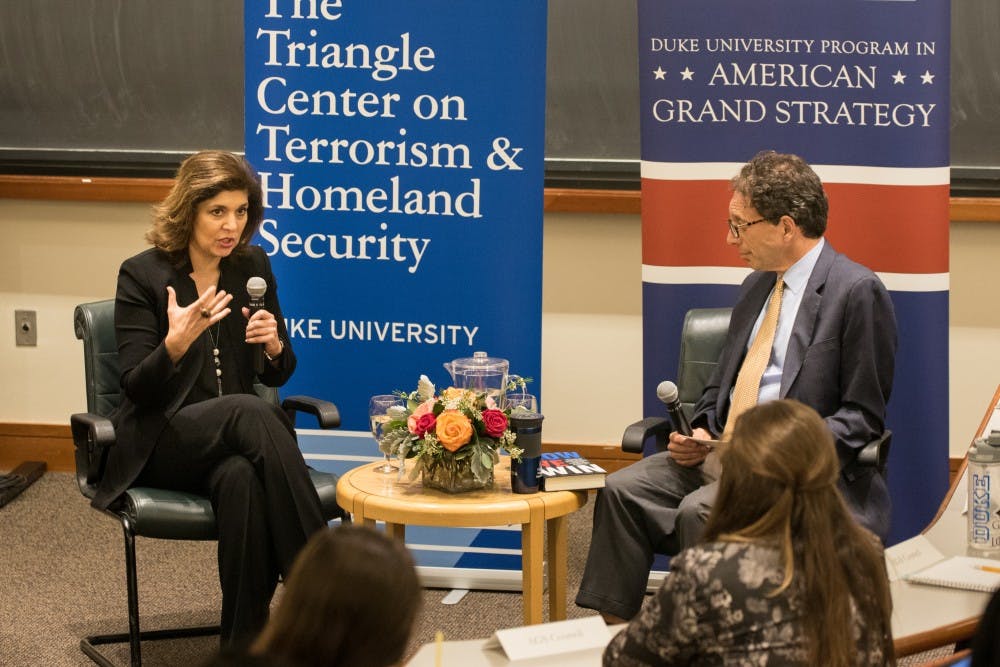On the 18th anniversary of the Sept. 11 terrorist attacks, a crowd gathered at the Sanford School of Public Policy to hear former diplomat Farah Pandith speak about combating violent extremism.
Pandith is the author of the recent book “How We Win: How Cutting-Edge Entrepreneurs, Political Visionaries, Enlightened Business Leaders and Social Media Mavens Can Defeat the Extremist Threat.” In a Wednesday conversation moderated by David Schanzer, professor of the practice in Sanford, she spoke about the factors that can draw young Muslims to violent ideologies and the ways in which governments and civilians alike can combat radicalization.
Pandith described Saudi Arabia as “the most important contributing factor” in recruitment to extremist causes around the globe.
“[The Saudis are] masters in soft power diplomacy,” she said.
She noted that the Gulf state has spent billions of dollars, in countries from Trinidad and Tobago to Tajikistan, to promote an image of Saudi Arabia as the arbiter on what Islam is and how the religion should be practiced. As part of this process, they have destroyed cultural heritage sites that did not match their desired narratives.
“If I can destroy history, and I can replace it [with] my own history, I’m telling the next generations what the real story is,” Pandith explained.
Saudi Arabia has been the center of media attention in recent years for funding extremist groups, including al-Qaeda, through bribes.
Pandith also spoke about the way that the Sept. 11 attacks changed the way people around the world thought about Muslims.
“There’s something profound, particularly that happened in the course of [Muslim children] growing up at this moment of time,” she said, "when the word ‘Islam’ and ‘Muslim’ were on the front pages of papers online and offline every single day of your life.”
While everyone faces identity crises, she added, young Muslims had particular challenges and asked particular questions because of this constant focus on one facet of their identity. In the age of the internet, she said, the answers sometimes came in the teachings of extremist groups.
Wednesday was the eighteenth anniversary of 9/11, and Pandith, who is Muslim, reflected on the way that it called her to public service. Her first response to the attacks was fear at how they would affect public perception of Muslims, she said. Her second response was anger.
“That response was purely, as I was reading the press, recognizing and getting really, really angry that [al-Qaeda] was trying to define my country, America, and was trying to define my religion, Islam,” she said.
That anger pushed Pandith into public service. She was working at the consulting affiliate of Mintz Law Firm at the time, she said, and her boss wrote to Andrew Card, White House Chief of Staff for President George W. Bush from 2001 to 2006, to ask him to help her get a job in the government.
Since then, Pandith has served as the Director for Middle East Regional Initiatives for the National Security Council and the first special representative to Muslim communities, among a variety of other government positions. She is an adjunct senior fellow for the Council on Foreign Relations, focusing on radicalization and extremism.
In order to truly address extremism, she said Wednesday, the government must work with a variety of groups, from “child and adolescent experts” to social scientists to theologians. Multiple government sectors, such as the Department of Health and Human Services and the Department of Education, have to work together with the Department of Homeland Security to create programs that stop young people from becoming radicalized.
However, Pandith said that there must also be changes in daily life.
“This is about hate,” she said. “And in 2019 we’re not just dealing with this kind of extremism; we’re dealing with all kinds of extremism, including in our country. And so some of the lessons in [“How We Win”] are about how do you build communities that don’t allow hate to thrive.”
She asked the audience to imagine that someone had said something disparaging based on an aspect of their identity while they waited in line at Starbucks. Avoiding these kinds of microaggressions, she said, will require cultural changes on college campuses, in schools, in history curricula and in language itself.
Pandith struck a more somber note as she argued that the American government has not done nearly enough to implement these kinds of solutions.
“Don’t tell me we’ve tried” she said, her voice rising. “We have done [things] ad-hoc; we have been limited in scope… we didn’t even try.”
Get The Chronicle straight to your inbox
Signup for our weekly newsletter. Cancel at any time.
She added that she was “terrified” about what the future of violent extremism will look like as technology changes how young people are recruited to violent ideologies.
When it comes to combating these new threats, she put it bluntly: “We have no plan.”
Speaking to The Chronicle after the event, Pandith pointed to young people as potential agents of the change that she sees as necessary.
“[Speaking to young people] is my favorite thing in the world to do,” she said. “What I know about millennials and Generation Z is that, unlike other generations, they aren’t as interested in waiting for the right moment in time. They want to do things now… It offers promise for our world.”
Matthew Griffin was editor-in-chief of The Chronicle's 116th volume.

